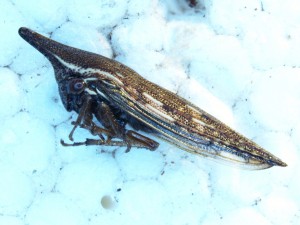CBP Agriculture Specialists Intercept Rare Pests in Cut Flower and Produce Shipments
Written by admin, Nov 19, 2015, Comments Off
 Courtesy U.S. Customs and Border Protection,
Courtesy U.S. Customs and Border Protection,
LAREDO, Texas – U.S. Customs and Border Protection agriculture specialists at Laredo Port of Entry discovered two significant rare pests in two weeks, including a first in the nation beetle on a shipment of cut flowers and a first in the port pest interception in a lettuce shipment.
“I want to congratulate our agriculture specialists at Laredo Port of Entry for their diligence and attention to detail that resulted in the interception of a first in the nation pest and a first in the port pest in a two-week period,” said Port Director Gregory Alvarez, Laredo Port of Entry. “Their outstanding work helps to secure American agriculture from serious economic harm that can be inflicted by infiltration of pest species not known to exist in the U.S.”
On Oct. 29, agriculture specialists at the Colombia-Solidarity Bridge import lot inspected a shipment of cut flowers. During examination of a sample of Queen Ann’s lace, agriculture specialists intercepted a scarab beetle later identified as Euphoria dimidiata. The interception is the first of its kind in the nation according to USDA’s Pest ID Database. According to USDA entomologists, this pest has never been found at any of the nation’s ports of entry.
The interception marks the second time in as many weeks that CBP agriculture specialists have found a “first in” pest. On Oct. 18, agriculture specialists at World Trade Bridge import lot intercepted a treehopper later identified as Polyglypta costata in a shipment of lettuce, a first for the port of Laredo. The pest has been found only six times since 1997, and never before in Laredo.
Both interceptions are examples of the diligent work CBP agriculture specialists do on a daily basis and are crucial in preventing foreign pests from becoming established in the US. Pests that are not known to occur in the U.S. may be detrimental to the nation’s agriculture industry. While some scarabs may feed on leaves, flowers, fruits and roots, some treehoppers may serve as vectors for plant diseases. Both of these shipments were turned over to USDA-APHIS-PPQ for treatment. CBP agriculture specialists continue to fulfill CBP’s agriculture mission by excluding harmful pests and diseases from becoming established in the U.S.
More information regarding CBP’s agriculture inspection mission may be found at this link
and this link as well.



